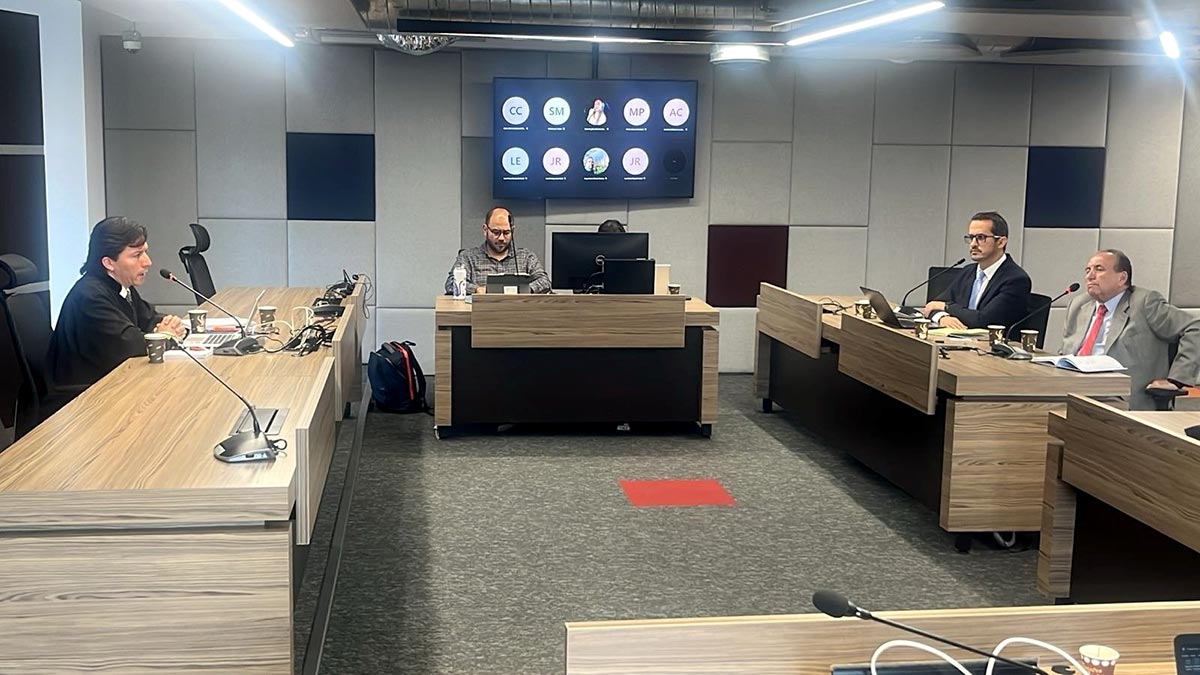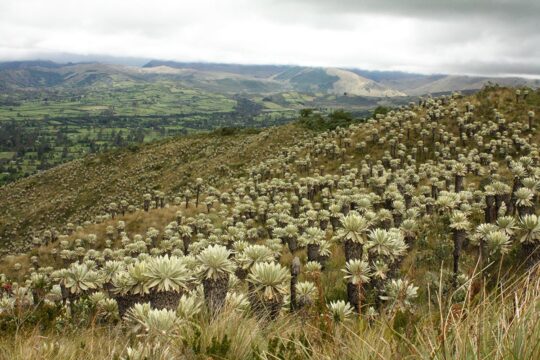The Special Jurisdiction for Peace (JEP), the judicial arm of Colombia's transitional justice system, has focused mainly on investigating war crimes and crimes against humanity committed by members of the defunct Revolutionary Armed Forces of Colombia (FARC) and the Colombian army, so far charging almost 100 former rebels and military officials.
In contrast, few civilians that financed or collaborated with parties to the conflict, have reached the JEP. There is at least one prominent politician and several citizens who aren’t known publicly, but no major economic or business actor, even though this is also part of its mandate. This could change with the dossier on Drummond, the largest mining company in the country today, signalled since over a decade ago of allegedly funding paramilitaries. Two of Drummond’s top executives, its current president and his predecessor, were charged by the Attorney General's Office and will have to decide in the coming months whether to appear before the special tribunal or defend themselves in an ordinary trial.
The case, in addition to being possibly the only one in which the JEP may try to establish the responsibility of important businesspersons, is even more interesting because it is advancing in three different tracks simultaneously: in the transitional justice, in the ordinary justice system and in US courts.
Drummond's controversial legacy
Drummond is a private company founded almost a century ago in the United States, owned ever since by the Alabama family whose name it bears. In fact, it was led for four decades by one family member, Garry Drummond, until his death in 2016. It began extracting coal in Colombia in 1995, at the La Loma Pribbenow mine located in La Jagua de Ibirico, in the Caribbean department of Cesar, in the north of the country. It then added two more mines, El Descanso Norte in 2008 and El Corozo in 2021.
Coal has been a highly profitable business for both the US mining company and the Colombian state. In 2023 alone, Drummond exported 27 million tonnes of coal, its sixth year leading that sector. That same year, the company claims to have paid 17 million dollars in taxes and royalties to the country, even operating in the midst of government promises to abandon production of one of the most polluting fossil fuels.
But it has also been a controversial company. In 2013 it was involved in one of the biggest environmental accidents in the country's history, when an overloaded barge dumped 500 tonnes of coal into the ocean to avoid sinking in an episode that sparked national outrage. Five years earlier, it had been fined $48 million by a high court for not properly settling its royalties.
"Confluence between paramilitary groups and Drummond"
What has generated the most noise, however, are accusations that it allegedly facilitated the expansion of paramilitarism in the coal-producing area of Cesar, which led to scores of murders and forced displacements.
The recent Truth and Reconciliation Commission (TRC) stated in its final report that "there was a confluence between the state military apparatus, the actions of paramilitary groups and the multinational Drummond to ‘secure’ its extractive project". The TRC gave credibility to testimonies that the mining company channelled money to a structure of the Northern Bloc of the United Self-Defence Forces of Colombia (AUC) operating in the coal mining area through cost overruns in the cafeteria contracts. This sponsorship, it explained, "was not only to neutralise armed actions against their assets, but also to favour the expansion of coal exploitation in the region".
The TRC also signalled Drummond of buying abandoned and dispossessed land from peasants at rock-bottom prices to expand its operations. In a case study on dispossession in Cesar, it said it was shocked by the Alabama company's "lack of human rights due diligence" in buying the Mechoacán lands and stressed that it had "a duty to know about the violence that raged against the owner families (...) and yet it went ahead with its acquisition".
Drummond has denied the allegations, saying that it "doesn’t have and never had any links with illegal organisations, regardless of their origin" and that it "has never financed or provided financial support to criminal structures".
Mining executives in court
In December 2020, the Attorney General's Office charged the most visible figures of Drummond’s Colombian operation with conspiracy to commit a crime, for allegedly promoting and financing the AUC’s Juan Andrés Alvarez Front between 1996 and 2001.
Both have been linked to the Alabama family business for decades: Augusto Jiménez was its president between 1989 and 2013, while José Miguel Linares succeeded him in the position after having been legal director and vice-president of corporate affairs. According to the Attorney General's Office, there is "abundant evidence" that the two executives "could have increased the value of food supplies with a contractor to obtain additional resources and use them to cover illegal obligations previously acquired" with the paramilitaries. With these payments, says the accusing body, "they apparently guaranteed the protection of their assets and freely exercised the coal mining operation".
Three and a half years later, the trial against both men has not yet started, partly because the legal case is being conducted under a previous inquisitorial criminal system, which was much slower in its pre-trial phase. Following an appeal, in May 2023 another prosecutor confirmed the indictment against the two.
To go to the JEP or not to go, that is the question
That accusation, however, opened another avenue for the two mining executives: since the crime they were charged with is related to Colombia’s 50-year-long armed conflict, they can turn to transitional justice.
The reason is that the 2016 peace agreement with FARC that underpins it contemplates the possibility of the JEP investigating, judging and sanctioning persons who had an “active and decisive role” in financing or collaborating with those who committed atrocities. However, the Constitutional Court later limited the JEP's mandate over these so-called 'civilian third parties' and determined that it couldn’t summon them, but that they could come forward voluntarily, under the same conditions and incentives as other actors. This ruling seriously limited the Colombian transitional justice’s range of action over civilians, giving rise to what legal NGO Dejusticia and academic Sabine Michalowski called its "restricted competence". This is why only a handful of civilians have reached the JEP, most of them already convicted in the ordinary justice system (the JEP has no jurisdiction over companies).
Therein lies the dilemma for the two Drummond executives: they may apply to the JEP and, should they acknowledge their responsibility, provide truth and redress their victims, they could receive more lenient 5-to-8-year sanctions in a non-penitentiary setting. Or they can opt to remain in the ordinary criminal justice system, in which case they’ll have to be defeated in a trial which counting a possible appeal could take up to five years.
The star witness
Although neither Linares nor Jiménez have applied to the JEP, the Drummond case has been moving through the transitional justice too. In November 2019, the JEP accepted Jaime Blanco Maya, the beneficiary of Drummond’s mine cafeteria contract with his company Servicios y Alimentación Ltda who in 2013 was sentenced to 38 years in prison as the mastermind of the murder of two union leaders at the mine.
According to that judge, Juan Andrés Álvarez Front paramilitaries murdered Valmore Locarno and Víctor Hugo Orcasita, two Drummond employees and leaders of the Sintraminergética trade union, in 2001 after discussing it with Blanco Maya. "It is clear that the real interest in having these murders committed lies with Mr. Blanco Maya," says the ruling, "not only because of his terrible relations with the union leaders, but also because it was evident that, through these deaths, he intended to end the pressure exerted by the union on improvement of the food service”.
In October 2021, the JEP granted Blanco Maya conditional release after deeming that he’d provided a "detailed and exhaustive" account of Drummond's alleged links to paramilitaries. His account, it said, "exceeds the threshold of what has been clarified in the ordinary justice system". Another witness, former paramilitary Jairo de Jesús Charris, convicted of the same double homicide, told the JEP that the company financed the illegal armed group and that the order "was to finish off the union, even if it meant having them killed". Salvatore Mancuso, the AUC’s former number two and convicted in the US for drug trafficking, also declared from his Atlanta prison that they met with US citizen James Lee Adkins, a former CIA agent who was Drummond's head of security in the 1990s and whose arrest was ordered by the Attorney General's Office in 2023.
Drummond v. Blanco Maya
In addition to insisting on its innocence, Drummond has also questioned the evidence against the company and its directors. "These allegations are not supported by credible evidence and are based primarily on false statements by convicted criminals who were paid for their testimony," it wrote after the Attorney General's indictment was confirmed in 2023. In its view, there is "a false witness cartel" promoted by the lawyers who filed three lawsuits in Alabama against the company from 2007 to 2013, which were dismissed and never reached trial.
That confrontation escalated again a month ago, when Blanco Maya testified before the JEP about links between the military, paramilitaries and civilian third parties. Drummond said publicly that its former contractor's testimony "is based on the story he fabricated for US lawyers (...) who filed lawsuits against Drummond in the United States, who made large payments on his behalf". According to the mining company, there is a "causal link" between Blanco Maya's story and transfers it attributes to US lawyer Terry Collingsworth for over $120,000. The US company says it gave the JEP eight dossiers with a thousand pages of evidence in its favour and questioned the tribunal’s decision to granting Blanco Maya legal benefits over what it called "a lying and accommodating account".

Meanwhile, the judicial proceedings conducted by the JEP this year have been marked by turmoil. In February, a week after a special tribunal hearing in Valledupar with victims, two trade unionists received text messages threatening and portraying them as "rebels disguised as trade unionists, peasants and NGOs". Maira Méndez, a lawyer for the Dutch NGO Pax for Peace who has worked on the case for a decade and is herself the daughter of another unionised Drummond worker killed by paramilitaries, also got one. The mining company rejected the threats.
A third lane in the United States
While the case is moving along two tracks in Colombia, it has also been in the courts in the mining company's home country for over a decade.
On the one hand, a US appeals court revived in 2016 part of the case brought by 45 victims in the coal transport railway corridor against Drummond, sending it back to the trial judge who had dismissed it and ordering a re-examination. In turn, the Alabama family business brought two civil actions against attorney Collingsworth and his former law firm Conrad & Scherer, one for slander in 2011 and another under the Racketeer Influenced and Corrupt Organisation (RICO) Act in 2015, alleging a criminal campaign against it that included payments to witnesses.
Those two countersuits caused the revived case against Drummond to remain in limbo while the US District Court for the Northern District of Alabama resolves whether they merit going to trial. Once resolved, that same court will have to decide whether the original case proceeds to a trial similar to the one a group of Colombian victims just won a fortnight ago in Florida against another US multinational, Chiquita Brands, for its responsibility in eight murders committed by the AUC. In that case, a jury ordered the banana company, which had already admitted to the US Justice Department having paid $1.7 million to paramilitaries, to pay $38.3 million to the families of eight murdered farmers. Collingsworth was one of the plaintiffs' lawyers.
What new can the JEP bring?
In the end, it is unclear what might come out of the Drummond case in the transitional justice. On the one hand, it could establish the criminal liability of its managers, something that has so far not happened in the justice system. "There is hope that this could be our iconic case of corporate accountability, like the industrialists in Nuremberg. The JEP’s thinking is that it cannot be a justice system that only investigates warriors," says Camilo Sánchez, director of the University of Virginia human rights legal clinic.
On the other hand, the question of what new truth the JEP can uncover remains, in a case that has been extensively documented by human rights NGOs like Pax for Peace and the Colombian Jurists Commission (which submitted a joint report to the JEP), state entities like the National Centre of Historical Memory, and the transitional justice itself, including both the Justice and Peace transitional mechanism for paramilitaries demobilised two decades ago and the recent TRC. "We need to broaden our understanding of the relations between the economic sector and armed actors, instead of continuing to focus on the cases that have historically gotten the most attention," says Daniel Marín López, a former TRC researcher and author of several studies on corporate accountability.
Even if it were to remain in the narrower scope of a decision on Blanco Maya, the JEP could open a process of symbolic reparation with the paramilitaries’ victims. "We have the opportunity of setting up a space for truth and restorative justice, which could even be a model for the Jurisdiction’s work," says Tatiana Devia, a lawyer who worked on the US-based Corporate Accountability Lab’s report to the JEP and also with the unionised victims.
All for one, one for all
In the end, the different legal tracks are likely to converge. If Drummond's executives choose to go to the JEP, they’d probably do so under pressure from prosecution's findings. If they choose to remain in the ordinary criminal justice system, the JEP’s inclusion of the mining case within a broader one on crimes by state agents in partnership with paramilitaries or civilian third parties would ensure its public profile remains high. Ultimately, regardless of how well the two institutions cooperate, if the Colombian justice system is able to determine the mining company's alleged responsibility in the expansion of paramilitaries, it would be a milestone for both.
It would also be one for victims', human rights and legal organisations that documented crimes committed by paramilitaries in Cesar and their possible links to mining companies. As lawyer Laura Bernal Bermúdez argues, Colombia has managed to prosecute and convict numerous economic actors for their complicity in serious human rights violations due to a mix of active civil society participation and the declining economic power of targeted companies. “While an increase in the power of the people (through the support of global actors and political opportunities) is necessary to secure judicialization and remedy, these results are only possible when they face an economic actor with reduced veto power,” she wrote in her PhD thesis at Oxford University.
Seeing its brand challenged in transitional justice and two other jurisdictions, coupled with the fact that it’s a fading industry in the global energy transition, could help an emblematic case in Colombia also end in a landmark ruling.








